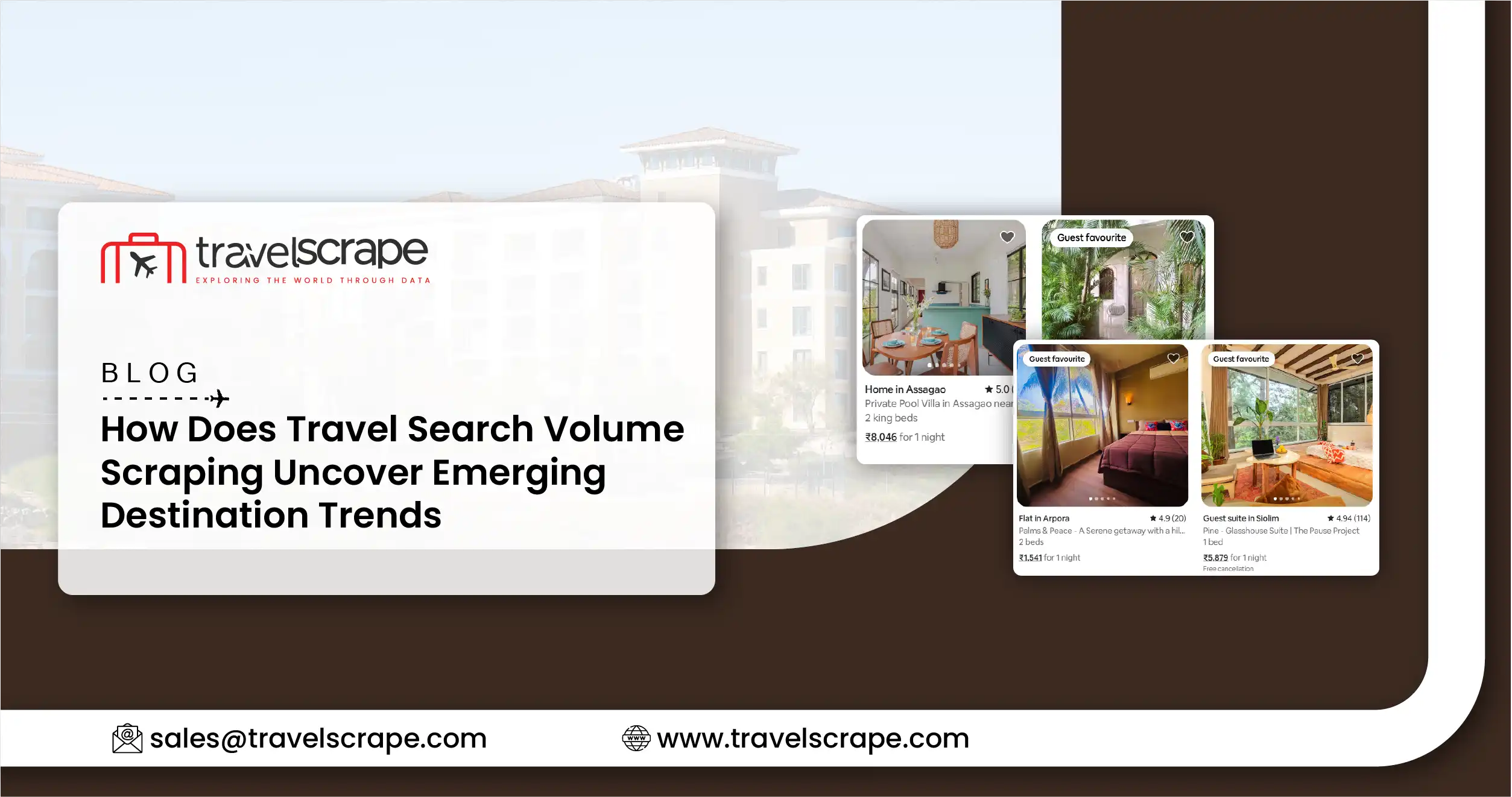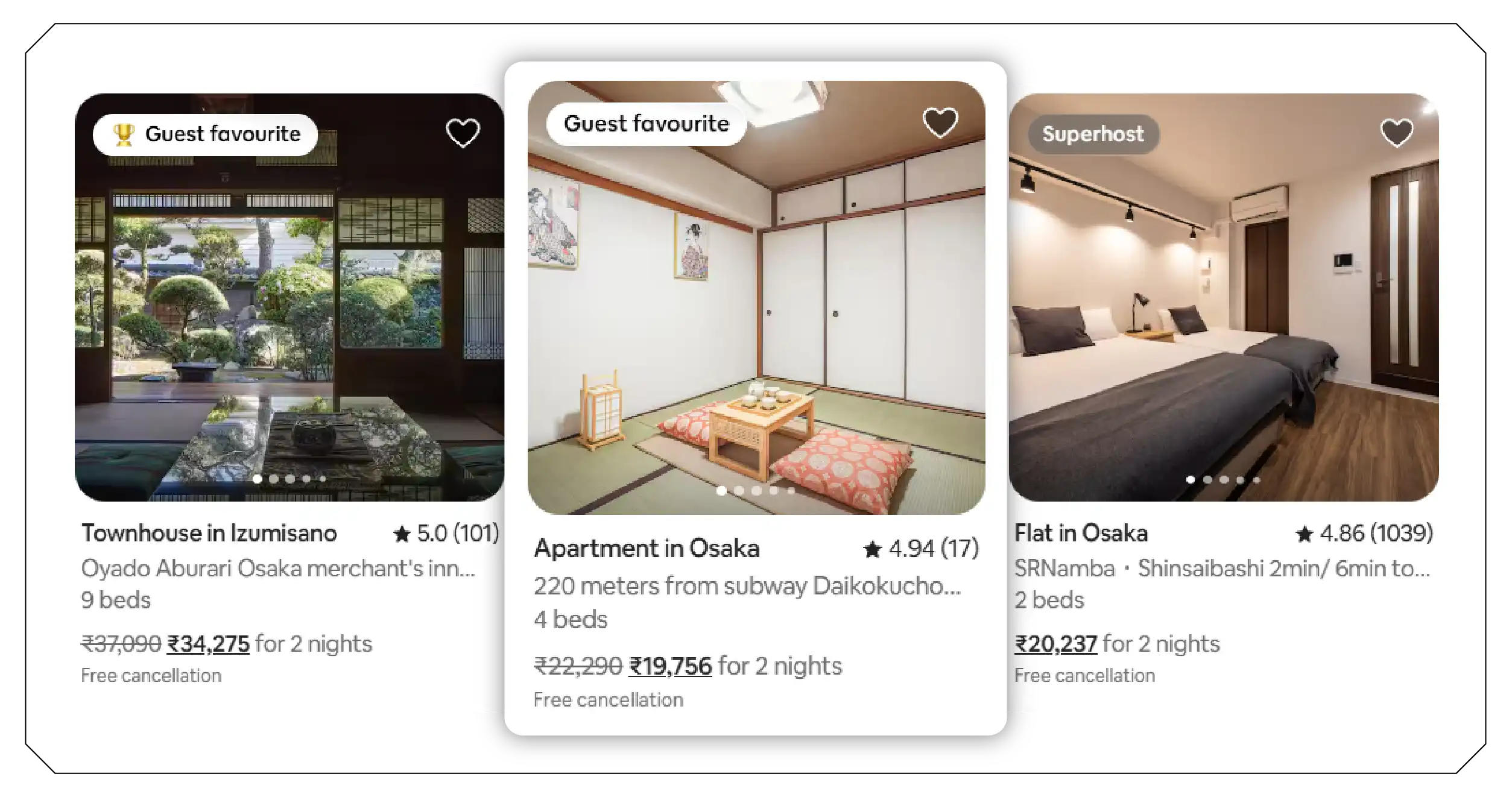How Does Travel Search Volume Scraping Uncover Emerging Destination Trends?

Introduction
In 2025, travel search volume scraping has emerged as one of the most strategic tools in the hands of travel marketers. It helps brands capture real-time search behavior, shifts in user interest, and intent signals from users actively planning trips. From vacation planning to flight bookings and destination searches, modern travelers rely on search engines and aggregators to shape their decisions.
With this shift, SEO for travel agencies now hinges on a deeper understanding of what travelers are searching for across regions, seasons, and platforms. As digital channels become increasingly competitive, advanced keyword scraping for travel has become essential to identify niche terms, optimize for local markets, and anticipate traveler behavior before competitors do.
This strategy contributes directly to demand prediction in tourism, providing marketers with foresight on where to allocate budgets, launch content, and position deals.
Understanding Travel Search Behavior in 2025

The travel journey begins long before a booking—it starts with a search. From "best places to travel in April" to "cheap ski resorts in Japan," each keyword reflects intent, curiosity, or readiness to act. Capturing these queries and trends allows brands to act on accurate, data-backed signals.
With advanced tools, brands can monitor:
- Changes in travel interest weekly or daily
- Shifts in intent (informational to transactional)
- Top-ranking content themes and formats
These patterns form the base of search trends in travel, shaping content calendars, PPC campaigns, and influencer collaborations.
Extracting Search Intent with Data
In today's travel marketing world, it's not just about the volume of search—it's about the intent behind the search. Brands can now extract search intent data to distinguish early-phase planners from high-intent bookers.
Types of search intent include:
- Informational: "Best beach destinations in July"
- Comparative: "Bali vs Maldives for honeymoon"
- Transactional: "Book flight to Bali 2025"
Using a Travel Scraping API, you can track these different search patterns, categorize them, and trigger different marketing workflows depending on the user's journey stage.
Web Scraping for Full-Funnel Travel Marketing
A comprehensive Travel Web Scraping Service goes beyond search engines. It captures data from travel aggregators, review sites, blogs, and booking platforms. This enables you to visualize the traveler's decision-making process in real-time.
Scraped data can include:
- Popular tour packages
- Frequently used keywords in reviews
- Regional search behavior
- Price drops and dynamic deals
Combining this with Travel Aggregator Insights ensures your content, offers, and ads are hyper-targeted and timed perfectly with user interest peaks.
Using Travel Data to Create Better Campaigns

With more people turning to mobile-first travel research, static campaigns are no longer enough. You need agile campaigns that adapt based on Travel Data for Marketing.
Key uses of this data include:
- Creating destination-focused content (based on trending searches)
- Personalizing emails based on regional travel interests
- Running ad campaigns during rising intent periods
Using Travel Data Scraping Trends, you can shift focus from outdated historical models to real-time intent modeling.
Going Granular with Destination Keywords
Blanket keywords are inefficient in 2025. With travelers now searching in hyper-specific terms, brands must rely on destination keyword analytics to tailor their strategies.
Real-world examples of high-converting scraped destination terms:
- "Cherry blossom Tokyo March 2025"
- "Remote beach resorts in Thailand"
- "Sustainable tours in South America"
When you scrape trending destinations, it allows you to rank early for emerging interest areas—before your competitors even notice the trend.
Empowering Campaigns with Scraped Keyword Tools
A powerful keyword tool for travel marketers, backed by web scraping, offers more than just search volume. It shows context, velocity, and market gaps.
Benefits of scraping-enhanced keyword tools:
- See rising keywords before they peak
- Detect abandoned keywords losing traffic
- Uncover regional keyword variations (e.g., "staycations in London" vs "weekend getaways in the UK")
This is the new face of data-driven travel marketing, where data guides every landing page, ad copy, and blog post.
Mapping Travel Search Patterns Across Markets
Global travel brands operate across different languages, currencies, and cultures. By scraping travel search patterns, brands can localize messaging and prioritize efforts where demand is growing.
For example:
- “Viaje barato en verano” trending in Spain
- "Luxury desert camping" is trending in the UAE
- "Solo trips for women" are peaking in the U.S.
These insights help align tone, visuals, and offerings with local context.
Leveraging Travel Aggregator Scraping
Travel aggregators scraping helps brands track what competitors offer, where they rank, and how frequently they update their listings. This is vital for pricing, visibility, and competitive positioning.
With this data, you can:
- Adjust prices dynamically based on similar packages
- Identify which competitors are dominating the rankings
- Track mentions of your brand or destination
Aggregator scraping also supports PPC planning with scraped data, allowing you to align your ad strategy with top-performing listings and high-searched travel themes.
Preparing for Seasonal Spikes
Every destination has its peak. With seasonal demand scraping, brands don't just react to booking trends—they anticipate them. Marketers can prepare for Christmas travel surges, summer getaways, or Diwali vacations months in advance.
Scraped data allows you to:
- Launch campaigns early for trending destinations
- Publish blog content when interest starts rising
- Adjust inventory levels or tour dates
Meanwhile, analyzing organic search behavior reveals how users naturally discover your content, helping you optimize for long-term traffic instead of short-term gains.
Google Trends + Scraping = Forecasting Power

When you combine Google Trends with a strong scraping system, you can build powerful prediction models. Scraping Google Trends for travel helps identify rising interest before it translates into bookings.
Overlay this with aggregator data, and you get:
- A macro view (global trend shifts)
- A micro view (real-time market demand)
- Actionable data for content, SEO, and paid ads
This helps marketers execute with precision across every channel.
How Travel Scrape Can Help You?
- Custom Keyword Scraping Solutions: We build tailored scraping tools to extract travel-related search volume from Google, Bing, YouTube, and travel aggregators, based on your target destinations, services, or seasons.
- Real-Time Search Intent Tracking: Our services help track what travelers are searching for right now—whether it's "summer trips to Greece" or "affordable ski resorts"—enabling agile marketing decisions.
- Localized & Multi-Language Search Volume Scraping: We scrape region-specific search data in multiple languages, giving you accurate insights for global and hyperlocal campaign targeting.
- Competitor Keyword Intelligence: Monitoring keyword usage and rankings on aggregator platforms and SERPs, we reveal what your competitors are ranking for and where gaps exist.
- Data-Driven SEO & PPC Planning: We turn scraped search data into actionable dashboards that support content creation, SEO strategy, and PPC campaign planning for high-converting keywords.
Conclusion
Data, not assumptions, shape travel marketing in 2025. Travel search volume scraping gives marketers an edge by tapping into what travelers are genuinely searching for. With tools and insights gathered through Travel Web Scraping Services, agencies can enhance search visibility, increase PPC ROI, and deliver improved travel experiences.
By leveraging all available data to track travel search patterns, marketers can refine their strategy based on real-time demand signals.
In this data-driven landscape, your success depends on how quickly you identify opportunities, and scraping helps you do so more efficiently.
So, whether you're planning for seasonal demand scraping, one thing is clear: those who scrape, win.
Ready to elevate your travel business with cutting-edge data insights? Get in touch with Travel Scrape today to explore how our end-to-end data solutions can uncover new revenue streams, enhance your offerings, and strengthen your competitive edge in the travel market.